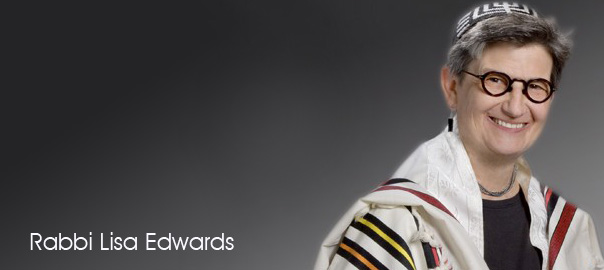Rabbi Lisa Edwards’ Weekly 10 Minutes of Torah (Week 8)

The latest commentary by Rabbi Lisa about Book of Numbers (B’midbar) titled “Evolving Justice”. It refers to PINCHAS, NUMBERS 25:10−30:1. Click here to listen to the commentary.
Our own Rabbi Lisa Edwards was chosen to give “10 Minutes of Torah” for nine weeks at the Reform Judaism’s website. Subscribe to “10 Minutes of Torah”
I was recently called to jury service in Los Angeles. As imperfect as this complicated, human system of law may be, the jury selection made me proud to be an American, especially as the judge instructed the potential jurors about the meaning of “presumed innocent.”
At the beginning of jury selection, when the judge in the courtroom asked the thirty-four potentialjurors how many of us thought the defendant was probably guilty, a majority raised their hands. He told us this is a common answer and understandable, but explained that in the United States every judge, every jury, must learn to presume innocence. Of course, we can easily find reminders of the difficulty of presuming innocence—from Guantanamo Bay to political scandals to the halls of justice everywhere—especially when fear and anxiety play a role.
I can’t help but think of our right to a fair trial, “a jury of our peers,” and a presumption of innocence as we open our Torah scrolls this week to Parsahat Pinchas. The parashah is named for the son of Aaron who, in a short narrative at the very end of Parashat Balak, took the law into his own hands by running a spear through the Israelite Zimri and his Midianite paramour, Cozbi, for their public display of affection (Numbers 25:5-9).
“What a good idea,” God seems to say. Inspired by the zealous Pinchas, God says, “Assail the Midianites and defeat them” (25:17). God rewards Pinchas, saying, “I grant him My pact of friendship [literally, “covenant of peace,” b’riti shalom]. It shall be for him and his descendants after him a pact of priesthood for all time” (25:12-13).
I’m hardly the only Jew disturbed by the actions of Pinchas or by God’s approval of him. Rabbis of the Talmud have a long discussion (Babylonian Talmud, Sanhedrin 82a), concluding that had Pinchas brought his case to a rabbinical court, the court would have told him: ‘The law may permit it, but we do not follow the law!’ “1 Numerous commentaries also ameliorate the reward of priesthood that God bestows on Pinchas and his descendants, suggesting that perhaps God does so in hopes that demands of the priesthood will make Pinchas less violent, and (or) allow him to atone for the lives he took.2

My favorite bristling at the violence of the story comes in the form of a visual midrash in the Torah scroll itself. Torah scribes scrupulously follow thousands of rules when writing a Torah scroll, among them that no letter may be broken . . . with one exception: the letter vav in the word shalomwhen God grants Pinchas, “My pact of friendship/b’riti shalom.” Why is thisvav alone to be written with a break in it? No one knows for sure, but many align with the suggestion that the letter vav, with its slight curve at the top, and straight up and down line, resembles a spear, perhaps the spear of Pinchas. The broken spear-shaped vav here in the word shalom invites us to see the imperfection/corruption of peace brought by the sword (suggesting that “the pen is mightier than the spear”3?). Add to that another nearby visual midrash: in Numbers 25:11 the letter yod in Pinchas’s name is written smaller than the other letters. “When we commit violence, even if justifiable, the yod in us (standing for the name of God and for Y’hudi, “Jew”) is diminished thereby.”4




